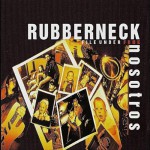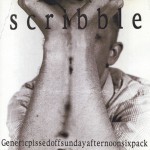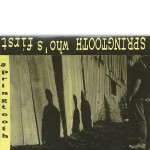 Rubberneck
Rubberneck
Nosotros
Locals Only Recordings
Rubberneck’s long awaited first CD has finally hit the streets. And it was worth the wait. Eleven new songs (and a reprise) mark the occasion, celebrating the band’s talent for cutting loose with well honed classic funk. It’s been two years since Rubberneck’s last release, a cassette called Simple. And in the interim they managed to travel to Europe where they underwent a well catalogued ordeal in Spain. The core of the band, brothers Pablo and Ricardo Ojeda have matured in the processÑ tightening their execution and affixing their focus. All of this is clearly evident on this impeccably recorded effort, produced at Falcon Studios with Dennis Carter.
The signature intro track “Rubberneck” (and the subsequent “P-Jam”), set the party mood. Ricardo’s skittering electric guitar and Pablo’s dithering basslines fuse to form the funk foundation while drummer Pat Stevens and percussionist Carl Smith (ex-Crazy Eights) effortlessly move beneath. The horn section of John Morrow on sax, Darrin Brooks on Trombone and Mark Chervin on trumpet maneuver through sputtering interjections with a felicitous groove. Stevens, Brooks and Chervin have played together a long timeÑ going back to their work with Houston Boules and Lip To Lip. That sort of persistent musical consistency is not acquired overnight. Morrow initiates a series of rapid fire eight-bar solos on this jam, quickly followed by Chervin, a brief return to the body of the tune and then Brooks contributes a silky smooth sixteen-bar trombone solo. From there, the fabric of the cut permutes in tone and texture, undergoing several metamorphoses, including Morrow’s second, extended soloÑ an incendiary explosion; followed by Ricardo’s laid back jazz solo and keyboardist Joey Porter’s fiery organ work. Jeez, talk about a showcase cut. Like Santana, combining with Archie Bell and the Drells to jam with Earth Wind and Fire. Yow!
The horn section propels “Sympathy,” with an Electric Flag feel. Ricardo’s greatly improved lead vocal adds power to the presentation, before all gives way to another series of solos. “Truth,” truly hearkens back to Santana (if they would have had a top-notch horn section). It’s a bluesy, bit of salsa flavored funk jam. “Hold On” changes gears nicely, slipping into a nifty, Little Feat-like groove, while Ricardo renders a better vocal imitation of Gregg Allman than Gregg does.
“Losin’ Touch” returns to the central funk format, punctuated subtly by Porter’s plucky Clavinet patch. Here Ricardo achieves a certain barrel-chested vocal resonance that is reminiscent of David Clayton-Thomas of the second version of Blood Sweat and Tears. The bluesy, laid-back feel returns with “Time Will Tell,” as the elastic horns stretch lazily behind Ricardo’s soulful vocal. Morrow wails through a fiery solo in the middle of this catchy number. Ricardo shines guitar rockets on “On My Way,” fretting a nimble salvo in the solo section. Ricardo’s guitar work takes a decided turn on “G-GrŸv,” wherein the band move to a much jazzier stance. Check out Porter’s McCoy Tyner-informed piano work, or the series of scintillating solos that follow.
Ricardo reels out yet another stylistic lollipop, with the Steve Cropperish feel he brings to “Real.” Once again the band move through several well-conceived solos with “All Good Love,” especially Ricardo’s Skunk Baxter influenced guitar turn.
This is a great party record. And an even better example of what Rubberneck sound like in a live setting. Perhaps the only complaint might be that all the solos become a bit tedious over the course of an entire CD. But apart from that qualm, Nosotros delivers full-throttle funk, with enough variety thrown in to keep the set from becoming totally predictable or boring. No, this is far from a boring recording. And the stellar musicianship throughout only makes it that much more enjoyable. Rubberneck prove themselves to be among the top three funk bands in town, with the Daddies and the
five Fingers of Funk. All three bands have funk in common, but really do not enter each others’ individual space. Rubberneck have a space entirely to themselves.
 Scribble
Scribble
Genericpissedoffsundayafternoonsixpack
Instant Records
What with the off-putting title of this effort, and the somewhat indolent callowness demonstrated on the first track, one might be tempted to convert this CD into a Frisbee. There’s some pretty cool guitar work, but the adnoidally challenged, sociopathic boy-next-door vocal approach has been played to death by auteurs in every culture since the days of Plato. Granted, it still sells, but maybe it’s time for us, as a species, to just get off of it.
And then, you like look on the sleeve to, you know, like try to figure out who’s playing what, who’s singing and all that… Call me crazy. Call me Ishmael. But is anybody else tired of this one name stylized mumbo-jumbo? “maia- dragon slaying. ian- axe grinding and yodeling. mike- hog calls and washboard. george- ass whoopin.” What gives? Is everybody ashamed of their family and their vocation? Are we all wanted by the law? Like it’s not cool to stand up and claim credit for the good work you do. Is that considered egotistical or something? An ego is like a gun kids. It’s perfectly safe in the hands of the proper authorities.
Because this is good work. Real good work. Get past that irritating first cut and the recording simply blossoms. Washboard boy Mike proves himself quite capable on the drums (translating here) on “Linoleum.” And the old axegrinder, Ian, swings a wide swathÑ interjecting jagged guitar figures through crying vacuum tubes. And it’s not entirely clear whether yodeling Ian or hog callin’ Mike are doing the vocals, but whoever it is, it is often powerfully evocative work. The total sonic picture sounds a lot like Afghan Whigs and does not dim beneath the comparison. Maia’s contribution in all this is somewhat vagueÑ the euphemism “dragon slaying,” proving too elusive. It is possible that he/she is responsible for the moaning, violin-like lead guitar. Or perhaps it is an actual violin. Who can say? Well… Scribble could, but they don’t. Therefore, with names and instrumentation at all points in question, out of the question, forget it. Two can play with the empty significance of genericity.
All the same, “Linoleum” generates real emotions worthy of people with names to own them.
“Idealistic Lovesong #2” reverts temporarily to a Lou Reedlike posture, before erupting into a wobbling rocker. Check out the feedback solo in the middle of this cut. Kind of like a Violent Femmes tune. Screaming guitars and a full-sprint rhythm transform “Favorite Waste,” into a writhing pit of snakes. The guitar solo uncoils like a King cobra rising from a basket. And the brief interlude in the middle is a thing of chaotic majesty. “Budd Bay,” combines a plaintive vocal with a circular guitar figure lifted from the Chambers Brothers’ “Time Has Come Today” or the Beatles’ “Dear Prudence”Ñbefore erupting into a delightfully drunken chorus. The lilting jungle waltz attached at the end is sweetly embroidered with golden guitar threads.
A bigbeat snare and a slithering bassline set the mood of “Shut Up Hooker.” Here’s a hit song folks. That swaggering beat recalls Squeeze, but with an urgency a generation removed from that band. Droning guitars and a tight focus make this track the most accessible of the lot.
Whoever they are. Wherever they’re from (the sleeve says they’re from Portland. But who can believe the sleeve? And is that like Pete Droge is from Portland?), Scribble are a good band. And whatever they’re playing, they do it well. They should be proud of it.
 Lavamatic
Lavamatic
Lavamatic
Self-Produced
Look out Portland, it’s another local “supergoup,” This three-piece unit combines the talents of drummer Jeff Cavanaugh, late of Completely Grocery; bassist Elizabeth Deal, formerly of Candy 500; and the mysterious Mondo- a long time guitar toiler with Poison Idea, who here handles the vocal chores as well.
The sound is fairly thick and dense on “Shouldn’t Run Away,” a cut that echoes the current Van Halen line up doing the old Van Halen material, maybe. As a vocalist Mondo proves himself to be assured of a resounding vibrato that recalls Ozzie, but more powerfulÑ like David Lee. Meanwhile Cavanaugh and Deal hold down the fort with unadorned tenacity. “Fire’s Gone” rocks with fiercer intensity. It’s a jagged piece of musical obsidian. Angular and sharp. But at the same time there seems to be a distinct Bachman Turner Overdrive edge to the whole thing. “Rejection” recycles familiar riffs into the mulch. A certain, early Urge Overkill feel grows out of it.
“Shelter For The Soul” slows the pace and is better for the transition. Mondo supplies a riveting open-string guitar figure and sings in a soft voice, implicative of Roger Watters of Pink Floyd, when they had hit songs. Somewhere along the way, the song builds in intensity and Mondo returns to his more technique-laden vocal self.
It’s odd. All three members of this band have had better moments and seemed more interested with former bands. This is a new relationship, perhaps slow to develop. The material would seem to be the big problem. Except for the first part of “Shelter For The Soul,” nothing here really rises above mundanity. Mondo has a good voice, but there is no real emotion in what he sings; nor in how he sings it. This poses a problem. Overall, there is a feeling of superficiality.
It was an old cliche put to me in an interesting way, just the other day. “Oil is a good thing. And water is good. But oil and water don’t mix- unless you add a lot of vinegar and shake it. Then you have salad dressing. Unless it’s motor oil. Then you just have a mess.”
 Thrillbilly
Thrillbilly
Thrillbilly Live
Self-Produced
If you haven’t caught Thrillbilly lately, you’re missing one of the livelier acts in town. Their highly charged brand of folk-rock calls to mind REM, without being imitative. Quirky vocalist J. Bowman leads the charge, backed by a solid four-piece band.
Lead guitarist James Carbaugh chimes the intro to “Wearing Miserable,” as second guitarist Doug Lindstrom, bassist Davy Hall and drummer Tom Kilman kick in at the turn around. Bowman owns a low, reedy voice that would seem to be comprised of equal parts Jerry Jeff Walker, Richard Butler, Michael Stipe and Johnny Cash. The result sounds like the Gin Blossoms.
“All About You,” comes closer to early-middle REMish material. But Bowman carves his own impassioned mark, avoiding easy comparisons. And Carbaugh’s guitar riff doesn’t have much in common with Peter Buck. Closer to the Cars. No one else is going to hear that in this song. Carbaugh’s shimmering glissades drone as Bowman intones soulful vocals on “Pieces.” Here the band sounds like an American version of middle-period Psychedelic Furs or latter-day Echo and the Bunnymen. Try to picture that in yer minds ear, if you can.
“Slacker” comes back hard, riding the wave of Carbaugh’s bagpipe-like riff and Lindstrom’s jangling rhythm guitar. Bowman pulls off his best Stipe take, dropping lot’s of “dew yew remember…” down-home enunciation. The corn pone country send-up “Multnomah County Jail” works well as comic relief. The “Okie From Muskogee,” “Redneck Mother,” approach seems frighteningly appropriate for the subject matter. Thrillbilly play it loose and with a sense of humorÑ and the song succeeds. “His eyes are black, his fingers broke/It’s gonna be a long night in jail.”
Thrillbilly are a no frills band. They don’t posture and pose. They simply play well-crafted songs, with strong hooks. They have no musical pretensions. But J. Bowman is a powerful singer, who demands one’s attention merely by his presence. And the band is faithful and dependable. Look for a full-length CD from the boys in the Fall.
 Springtooth
Springtooth
Who’s First
Self-Produced
As most of you probably know, Springtooth are the current project of former Dharma Bum, firebrand guitarist Eric Louvre. For all his contributions to the Bums, Eric never really received the attention he deserved. As is often the case, Eric stood in the shadow of the frontman Jeremy Wilson- who was certainly deserving of the attention he got. Here, Eric has found a vehicle to showcase his own formidable singing and songwriting talents, as well as his stalwart guitar work.
“Americana” is an edgy, brooding dirge, with an anthemic chorus. Eric sings with a rich, husky baritone, wherewith he conveys a broad spectrum of emotions. “Anna Lee” heads in a different direction. A big, ballsy chord riff moves in syncopation with the straight ahead rhythm section, while Eric groans the lyric. The Smithereens come to mind. A cool song.
With a jaunty chorus and an optimistic outlook, “Shine Again” seems perhaps a bit anachronistic, given the angst-ridden malaise we are experiencing here at millennium’s end. But give the guys points for showing versatility. “Down” is a sad and pretty ballad that builds slowly in intensity. Eric sounds a lot like a contemplative Jackson Browne hereÑ with a ’90s sensibility.
Chunky rasquedos pepper the rhythm of “Childhood Heroes,” a thoughtful contemplation of some of the bitter realities of encroaching adulthood. Eric submits a brief, but heartfelt guitar solo in the middle section. A curious syncopation between drums, guitar and the vocal drives “Please In Sorrow.” A straight ahead chorus again recalls the better part of the Smithereens. “Shadowland” exhibits certain early REM characteristics, although the yearning chorus strays from that correspondence.
A tougher, more organic attitude permeates “Come Purify.” Here he sounds like early Stevie Winwood singing in the choruses over the whetted blade of his straightrazor guitar. Check out Louvre’s homage to Lennon’s “Cold Turkey” in the solo section. That signature syncopated crunch sound returns on “Rainy Drive.” At times Eric bears an uncanny vocal resemblance to the Smithereens’ Pat DiNunzio. Springtooth play harder and faster than the Smithereens, but the knack for a strong hook over a straight ahead rock beat is something the two bands have in common.
“No Rain Today,” takes a different road. Something of a raver, the song has a strong chorus, with great harmonies and a slick eight-bar solo. “In The Open” combines those harmonies with an aching chorus. Another enthusiastic number is the good-natured rocker “Happy Distress,” where, in the chorus, Eric manages to sound like Kurt Cobain a little. In its structure, the final tune, “Paper Fuse,” actually calls to mind the Dharmas. Piquant, groaning choruses and flaming turnarounds rend rare essences and volatile spirits. This is the only track where Eric takes a couple of extended guitar solos and they are things of restrained beauty. A keeper.
Eric Louvre and Springtooth have migrated some distance from the sound of the highly successful Dharma Bums. Springtooth’s sound is heavier, more mainstream and more accessible on a broader level. But the power and conviction that drove his former band is highly evident in Springtooth. Their energy and craftsmanship set them apart from a majority of their peers.
 Bluegene Rayburn
Bluegene Rayburn
Finger
Self-Produced
I consider perfect pitch to be a curse. There is no practical use for it. It does not pay the bills. It offers no consolation in times of trouble. It does not clean the bathroom nor do the dishes. Perfect pitch is like a bad roommate. What’s more, perfect pitch is moody. It will set your teeth on edge at the slightest vibrational disparity, rendering efforts like Bluegene Rayburn’s Finger unlistenable.
Doubtless Ross Burdick is a fine young man, with many admirable qualities. Unfortunately, carrying a tune is not among them. With his guitar mercilessly grinding away like a concrete saw, he balefully ululates the words to “Brushhead.” Perhaps it’s a problem with his vocal monitor, but he consistently falls way out of tune at the end of phrases. There are techniques that can help him to overcome this malady if he might be so inclined to seek them out.
“Scotch” fails to distinguish itself to a much higher degree. There is some lyrical interest in the dysfunctional perspective lent to the subject of alcoholism, although it is not clear where exactly the band means to be coming from. “All Of Me” starts out hopefully, as bassist Jake Adams sets the mood with a stark bass figure and Burdick offers pensive volume knob fills, as the song builds into a passable song. Adams and drummer Peter Lawrence lay adequate foundation for a fairly familiar sounding anthem dedicated to interpersonal lack of communication. Burdick cuts loose with a satisfying guitar solo.
“Mulva” shows some structural promise, but the lyrics and melody of the song go nowhere at all. Burdick has ability on the guitar, but his tone sucks through a straw.Not so though in the comparatively few softer passages, as in the intro of “Dolores,” wherein he manifests chorused arpeggia with distinct clarity. The softer presentation of this song allows the tuneless aspects of Ross’ voice to work for him, in a Lou Reed kind of way. But when he tries to escalate into the Tool/Helmet realm of turpitude, he seems quite out of his vocal league.
Bluegene Rayburn have a long way to go. Competition is fierce in this town. In order to succeed, a band must discover its strengths and weaknesses; and confront them honestly. Though the earnestness of this trio is beyond question, at some point they will have to look hard at either working very hard to overcome their deficiencies; or to migrating toward a softer musical stance. Unfortunately, the only other alternative is musical extinction.
